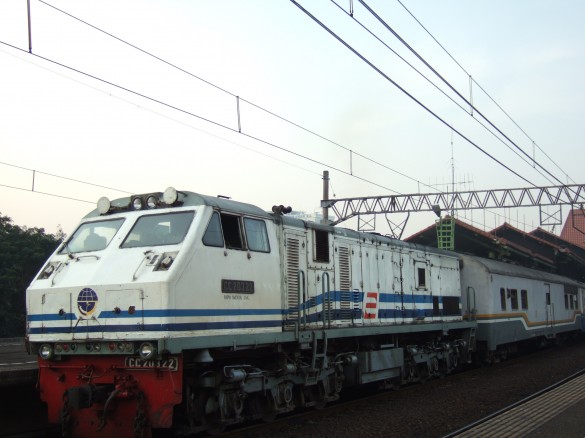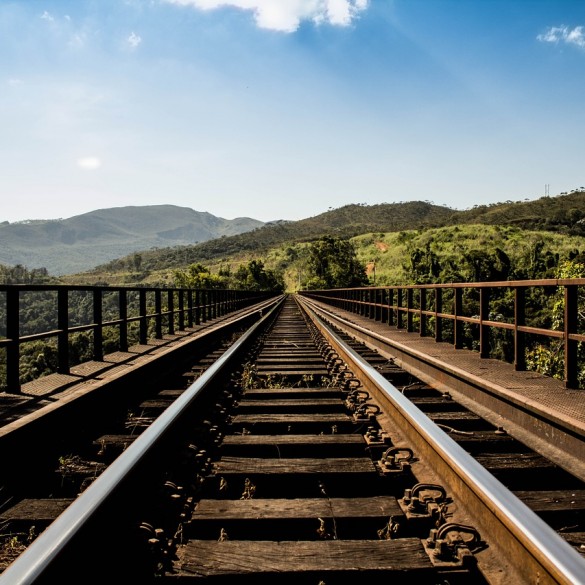The Government will fund the Trans-Sulawesi railway project entirely, without private investors, in hopes that it will pull foreign money to the region later.
The construction of 4,679 kilometres of railway along the coastline of Sulawesi, known as the Trans-Sulawesi railway project, is expected to stimulate Indonesia’s economy in coming years, even as the Government deems the project unattractive to foreign investors.
According to the Transportation Ministry’s Director General for railways Hermanto Dwiatmoko, the project will be funded entirely from the Government’s coffers, as public railway transportation projects rarely bring in enough revenue to entice private investors.
“All [of the initiatives] will be funded with rupiah because this is not commercial, it’s not benefitting [investors],” Dwiatmoko tells Indonesia Expat in an interview. “This project is strictly the responsibility of the Government.” Dwiatmoko says the Government never planned to attract private backers to the Trans-Sulawesi railway, as it knew from the start it would be a tough sell.
The rural island has far less economic activity than its more urban neighbouring islands of Sumatra and Java. For this reason, Dwiatmoko believes it will still be years before private capitalists take a serious interest in Sulawesi’s infrastructure.
“When it comes to building infrastructure, we can’t [think too much about] making money or not. We are thinking for the next 50 to 100 years,” explains the Director at his office in Central Jakarta. “If the railway doesn’t exist now in Sulawesi, it might be alright. But what if we’re too late in building railways [there] like [we were] in Jakarta? We’re too late in building an MRT here and look how bad the traffic is now.”
The Trans-Sulawesi railway project is estimated to cost Rp.216 trillion (US$15 billion), and if construction is carried out according to plan, the line is scheduled to begin operating in 2018. However, Dwiatmoko says this year’s budget for the project stood at a mere Rp.971 billion (US$69 million), consisting of Rp.200 billion (US$14 million) for land acquisition, Rp.52 billion (US$4 million) for concrete installations, and Rp.719 billion (US$51 million) for the railway construction.
“We’re targeting to install 16.1 kilometres of railway by December 2015,” says Dwiatmoko. However, the project is already behind schedule. The first phase, construction of a 145-kilometre line from Makassar to Parepare — both cities in South Sulawesi — was supposed to begin in July, but was ultimately postponed.
Local administrations failed to complete land acquisition for an initial 30-kilometre stretch of land in June. Dwiatmoko says he is sure local administrations will be able to acquire the rest of the required land by the time President Joko Widodo inaugurates the construction stage of the Trans-Sulawesi railway come mid-October. “Jokowi has planned to be there [for the groundbreaking ceremony],” says Dwiatmoko, adding that the rails will be imported from China and Japan. Both nations are also currently vying for the opportunity to help build the bullet train from West Java.
As of August, out of 871 different plots of land that needed to be acquired, only 458 have been secured, says Dwiatmoko. The plan is that these important 30 kilometres of land will be purchased using the regional government’s budget in the amount of Rp.100 billion (US$7 million).
“Payment for the land acquisition [using the regional budget] has reached 60 percent and the rest will be finished this month,” South Sulawesi transportation, communication, and information bureau head Masykur Sulthan told the public in August. Now, Dwiatmoko says the rest of the first phase will be funded by the state budget, with the central government claiming to have allocated Rp.200 billion (US$14 million) in an effort to acquire 70 more kilometres of land. “So that leaves us with 45 kilometres of railway left [with no allocated budget yet],” he explains.
Despite what the director general says about a groundbreaking ceremony, the Trans-Sulawesi railway, in fact, already had one in 2014. The then-coordinating economic minister Chairul Tanjung was in attendance. But alas, the project has been stalled since the ceremony, primarily due to a lack of funding, along with ongoing land acquisition conundrums that are all too common in the archipelago.
Trans-Sulawesi falls under Jokowi’s nation-wide railway project that’s looking to lay down 12,100 kilometres of track across the nation and utilise US$60 billion between 2015 and 2030. Dwiatmoko says the Ministry will need Rp.19.84 trillion (US$1.4 billion) to start all the railway projects this year.
Although no private investors will be involved in the projects this year, he says, private sectors were expected to contribute at least 70 percent of the funds needed for railway projects over the next 15 years.
This is optimistic, considering foreign investors like Japan and China will need to come into play, and many Government policies run counter to such efforts — some legislations encourage foreign private investments while others seem protectionist and nationalistic.
“For this year, the nationwide projects will be exclusively financed by the state budget because a public-private partnership [PPP] mechanism for Kalimantan and Sumatra will not be feasible and profitable,” the Director General reaffirms.
With such a large budget at stake, anti-graft activists have also raised concerns that a mega project like the Trans-Sulawesi railway is ripe for corruption in the form of embezzlement. A recent study by the Indonesia Corruption Watch (ICW) shows infrastructure and regional budgets are the sectors where cash is most often siphoned from. It places local administrators at the top of the list when it comes to this form of corruption.
The Ministry’s railway directorate-general secretary Imran Rasyid says all transactions in the Trans-Sulawesi project are sure to be transparent and accountable. “No hard cash will be involved. All transactions will go through bank accounts. Moreover, the documents in the land acquisition process have to be clear, such as the original owner of the […] land and whether that person truly owned the land before or not,” explains Rasyid.
Apart from Sulawesi, the country’s other big railway projects will take place in Sumatra, Kalimantan, Java, Bali, and Papua. The Government hopes to cut Indonesia’s high logistics costs, which often result in a lack of competitive goods prices when pitted against those of other ASEAN countries.
That said, Dwiatmoko says a railway project like Trans-Sulawesi is expected to boost the local economy by making it faster and easier for people to transport goods, thus making a less dense population in Sulawesi more attractive to private investors. “What’s important is for the railway to exist first, then the demand [for businesses] will start coming in,” he adds.
Railways are also an integral part of Jokowi’s “sea toll road” maritime programme, in which as many as 11 major and feeder ports are currently being modernised. The push is an effort to ease passenger traffic from the eastern to western parts of the archipelago, and vice versa.
Aside from personal transport terminals, however, 13 ports will be specially designed to facilitate cargo handling. The ports are in two of the working regions run by state-owned port management firm PT Pelabuhan Indonesia (Pelindo). Cities in Sulawesi, such as Makassar and Parepare, are also included in Jokowi’s maritime programme.
Dwiatmoko suggests the fates of railway and maritime infrastructure projects are in fact intertwined. He says, “If there are ports but no inter-land connection [to transport goods to and from the ports], the maritime programme will simply go to waste.”




